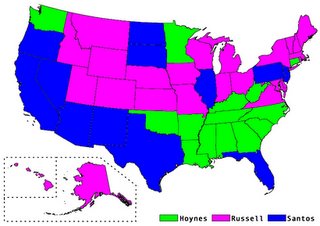2006 Democratic primaries

A West Wing Word
Well The West Wing was preempted again this week, a new episode is coming next week however. Though there is nothing new to report from the world of my favorite political drama, I did find this cool electoral map on the internet that I thought it might be fun to explain. This background information might help new viewers (or old viewers who have lost track of the program) catch-up on recent fictitious political history.
In the 2006 democratic contest to succeed Jed Bartlet of New Hampshire as the President of the United States, the early front-runner was populist Pennsylvania Governor Eric Baker. However Baker backed out of the campaign before it even began in December of 2005, leaving most commentators to view the nomination race as a contest between the two vice-presidents.
The first vice-president was John Hoynes of Texas, who had served as Bartlets VP from 1999 until his resignation as part of a sex scandal in the spring of 2003. Hoynes wrote a tell-all autobiography titled Full Disclosure that was published in late 2005 and which he intended to serve as a 'coming-clean' to clear the way for his 2006 run for the presidency.
The other vice-president was Robert "Bingo Bob" Russell, former Congressman out of eastern-Colorado with strong ties to the mining industry. Russell was tapped as Bartlets VP replacement for Hoynes after his first choice for the job, controversial Secretary of State Lewis Barryhill, proved to difficult a sell to put before the congress.
These two candidates dominated the group of seven that ran in the early primaries, with Hoynes concentrating on his 'southern strategy' and ringing up a few other states, while Russell found success most every-where else. Comming up the rear however was dark-horse candidate Texas Congressman Matt Santos (he had come in last place in the Iowa caucuses), who pulled of a surprising 3rd place finish in New Hampshire with 18% of the vote after a courageous live TV add in which he promised not to use negative campaigning. Santos continued to hold steady in 3rd place nationally among the Democrat's for some time after New Hampshire, thought he did have victories in the heavily Hispanic New Mexico and Arizona primaries.
The situation changed again however on the eve of the super-Tuesday primary when charges of an additional sex-scandal dating back to John Hoynes days in the Senate (1991-1999) came to light (he had apperently had sex with a young intern). Hoyns plummeted in the polls as a result of the scandel, and the charismatic Santos was able to pick up much of his slack gaining major victories in California, Florida and his home state of Texas. One might say that Santos peaked a little to late however, as even his victory in the last held primary (New Jersey), did not put him quite over the top in terms of the amount of delegates needed to be nominated on the first ballot.
The 2006 Democratic National Convention held in San Jose California, opened with no clear front-runner for the nomination. The contentious and embarsing spectacle of a divided convention was made even more chaotic by the late re-entry of Governor Baker into the race from the floor of the convention hall. Baker effectively neutralized Hoynes as a factor in the race, and while pulling a sizable delegate count from Russell, he was hitting Santos particularly hard in the larger more liberal states where the congressman had experienced most of his previous success. Fortunately another powerful speech by Santos to the convention persuaded a reluctent President Bartlet to finally take sides in the contest, with the sitting chief executive pressuring a powerful teachers union (which had been opposed to Santos due to his stance on teacher tenure) to shift its delegates to the Congressman from Texas.
On the 4th ballot Matt Santo of Texas was nominated as the Democratic candidate for President of the United States. Congressman Santos selected former Labor Secretary and White House Chief-of-Staff Leo McGarry of Illinois (who had chaired the convention) as his runningmate. The Republicans nominated California Senator Arnold Vinick (a political moderate and himself an early dark-horse in the Republican primaries), and West Virginia Governor Ray Sullivan as their presidential ticket.

0 Comments:
Post a Comment
<< Home